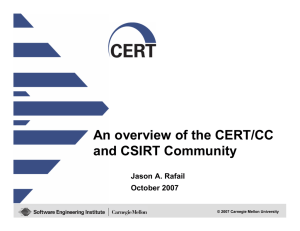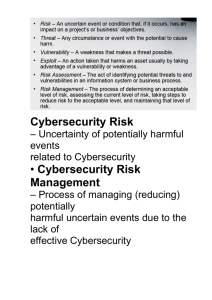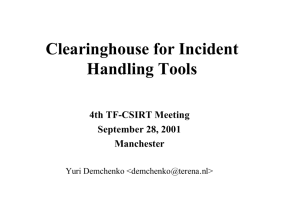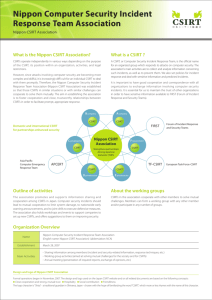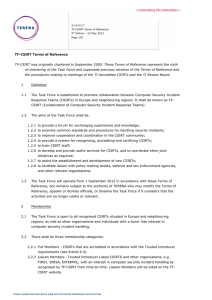tf-csirt
advertisement
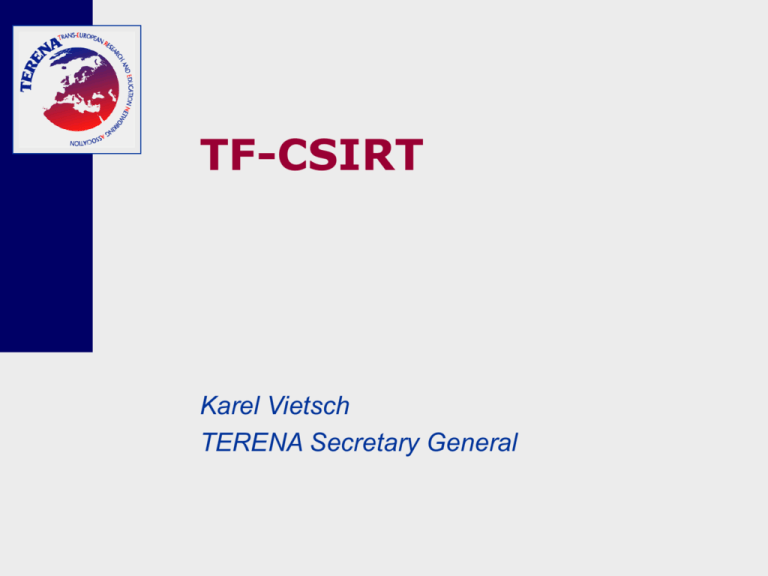
TF-CSIRT Karel Vietsch TERENA Secretary General TF-CSIRT mission • To promote the collaboration between CSIRTs in Europe • Aims: – Provide a forum for exchange of experience and knowledge – Establish pilot services for the European CSIRT community – Promote common standards and procedures for responding to security incidents – Assist in the establishment of new CSIRTs and the training of CSIRTs staff – Co-ordinate other joint activities – Provide a vehicle for CSIRTs in Europe to liaise with the EC and other policy-making bodies Creation of TF-CSIRT • TERENA Task Force: – Operation defined by Terms of Reference – Two years recurring lifecycle (originally created May 2000, mandate renewed May 2002) – Members and non-members of TERENA – Active participation by TF members – Success depends on TF members’ commitment – TERENA plays role of professional facilitator TF-CSIRT way of working • Meeting every four months • Venue rotates among members who volunteer to host • Two days: – 1st day for seminars and presentations – 2nd day for Task Force business meeting • Evening in-between: dinner organised by the hosting member • Contacts between meetings provided by mailing list and project groups Who is involved? • Academic, Government, Commercial CSIRTs Participation in meetings 70 60 50 40 30 20 10 0 '00-1 '01-1 '01-2 '01-3 '02-1 '02-2 '02-3 '03-1 '03-2 '03-3 people CSIRTs Wider Co-operation • European Commission – Projects (eCSIRT.net, EISPP, TRANSITS) – Legal handbook for CSIRTs – Network & Information Security Agency • National governments – Government CSIRTs – Consultation on new legislation • Law enforcement – Operations and invited speakers at meetings • Other regional initiatives Deliverables and Projects • • • • • • • • Trusted Introducer Service Incident Object Description & Exchange Format RIPE IRT object Clearing House for Incident Handling Tools CSIRT training course (TRANSITS) Incident Information Exchange (eCSIRT.net) Assistance to new CSIRTs (Best Current Practice) Incident Handling Procedures Deliverables – Trusted Introducer (http://www.ti.terena.nl/) • Notion of ‘trust’ – is a contact trustworthy? • Currently, no scheme generically applicable • TF-CSIRT to work out a model of which it believes it fulfills criteria needed at operational level • Feasibility and sanity checks • Now, outsourced to a 3rd party • TF-CSIRT retains control by TI Review Board Deliverables – IODEF (http://www.terena.nl/tech/task-forces/tfcsirt/iodef.html) • Incident Object Description & Exchange Format • Cross-platform, cross-language, cross common understanding • Need for a well-understood definition of an incident • Bottom-up working group • Lots of output, among which RFC 3067 • Now transferred to IETF (INCH) Deliverables – IRT database object • Commonly perceived problem: correct points of contact in (RIPE) database • Practical approach: – what do we miss now? – how can we design it – how can we implement it? • Wishlist followed by discussion in RIPE database group • Lots of iterations, but eventually implemented and populated Deliverables – CHIHT (http://chiht.dfn-cert.de/) • Clearing House for Incident Handling Tools • Share information on tools CSIRTs use – Help new and existing teams • Website listing tools by category – Evidence gathering & investigation, system recovery, CSIRT operations, remote access, proactive tools – Plan to add procedures and best practice • Contents suggested by active CSIRTs Deliverables – TRANSITS (http://www.ist-transits.org/) • CSIRTs were seeking relevant training • Idea: best transfer of knowledge is from operational people to operational people • Conclusion: best people to write it are TF-CSIRT members • Two day course developed in modules: – Operational, legal, technical, organisational, vulnerabilities • EC funding for delivery and updating – Six presentations over three years – Materials available to CSIRTs for own use
